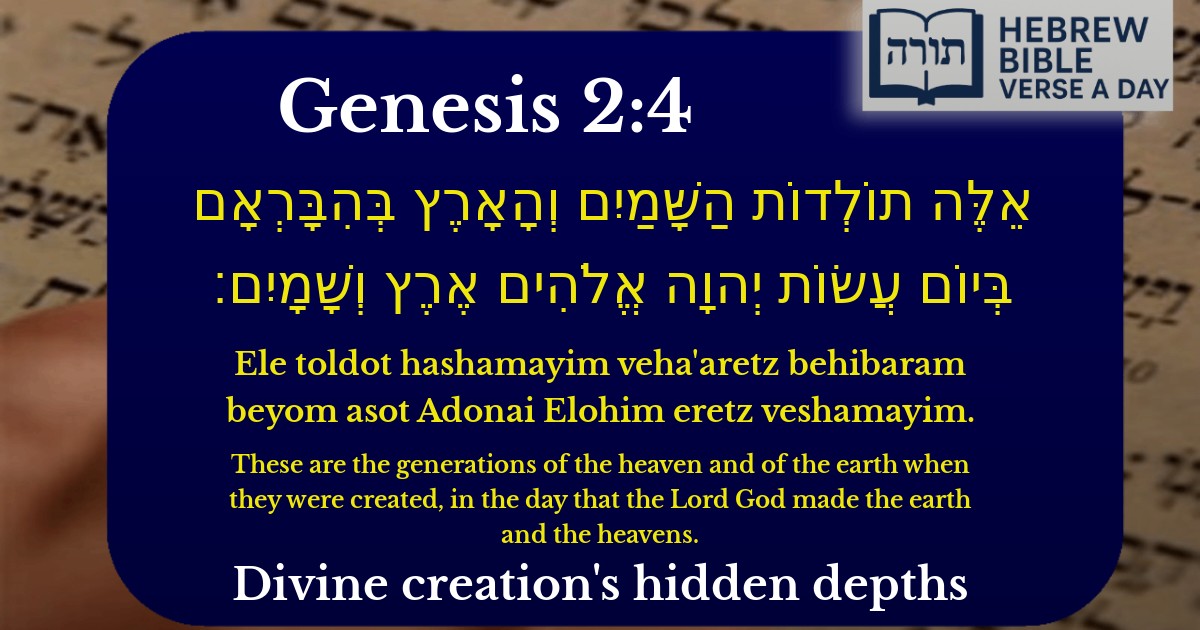Join Our Newsletter To Be Informed When New Videos Are Posted
Join the thousands of fellow Studends who rely on our videos to learn how to read the bible in Hebrew for free!
Hebrew Text
אֵלֶּה תוֹלְדוֹת הַשָּׁמַיִם וְהָאָרֶץ בְּהִבָּרְאָם בְּיוֹם עֲשׂוֹת יְהוָה אֱלֹהִים אֶרֶץ וְשָׁמָיִם׃
English Translation
These are the generations of the heaven and of the earth when they were created, in the day that the Lord God made the earth and the heavens.
Transliteration
Ele toldot hashamayim veha'aretz behibaram beyom asot Adonai Elohim eretz veshamayim.
Hebrew Leining Text
אֵ֣לֶּה תוֹלְד֧וֹת הַשָּׁמַ֛יִם וְהָאָ֖רֶץ בְּ<small>הִ</small>בָּֽרְאָ֑ם בְּי֗וֹם עֲשׂ֛וֹת יְהֹוָ֥ה אֱלֹהִ֖ים אֶ֥רֶץ וְשָׁמָֽיִם׃
אֵ֣לֶּה תוֹלְד֧וֹת הַשָּׁמַ֛יִם וְהָאָ֖רֶץ בְּהִבָּֽרְאָ֑ם בְּי֗וֹם עֲשׂ֛וֹת יְהֹוָ֥ה אֱלֹהִ֖ים אֶ֥רֶץ וְשָׁמָֽיִם׃
🎵 Listen to leining
Parasha Commentary
📚 Talmud Citations
This verse is quoted in the Talmud.
📖 Chagigah 12a
The verse is discussed in the context of the creation of the heavens and the earth, exploring the order of creation and the nature of the universe.
📖 Sanhedrin 38a
The verse is referenced in a discussion about the sequence of creation, particularly focusing on the phrase 'in the day that the Lord God made the earth and the heavens.'


Overview of the Verse
The verse (Genesis 2:4) serves as a transition between the account of Creation in Genesis 1 and the subsequent narrative. It summarizes the creation of heaven and earth while introducing a shift in focus toward the detailed story of Adam and humanity. The phrasing "אֵלֶּה תוֹלְדוֹת" ("These are the generations") is significant, as this formula appears throughout Genesis to introduce new sections.
Rashi's Commentary
Rashi (Rabbi Shlomo Yitzchaki) explains that the phrase "בְּהִבָּרְאָם" ("when they were created") is written with a small ה (heh), hinting at a deeper meaning. He cites the Midrash (Bereshit Rabbah 12:10), which teaches that the world was created with the letter ה, representing divine mercy. The small ה suggests that the world was created with a diminished measure of mercy, implying that strict justice was also present at Creation.
Rambam's Perspective
Maimonides (Rambam) in Moreh Nevuchim (Guide for the Perplexed 2:30) discusses the phrase "בְּיוֹם עֲשׂוֹת" ("in the day that the Lord God made"). He explains that the Torah uses anthropomorphic language ("day") to describe Creation in terms humans can comprehend, though time as we know it did not exist before Creation. This aligns with the philosophical understanding that Hashem transcends time.
Midrashic Interpretations
Kabbalistic Insight (Zohar)
The Zohar (1:15b) interprets "תוֹלְדוֹת הַשָּׁמַיִם וְהָאָרֶץ" ("generations of heaven and earth") as referring to the spiritual and physical emanations that sustain the universe. The phrase "בְּהִבָּרְאָם" is read as "בְּה״ בָּרָאָם"—"with the letter ה, He created them," alluding to the divine energy channeled through the sefirot.
Halachic Implications
The Talmud (Chagigah 12a) derives from this verse that the heavens were created first, followed by the earth, yet both were completed simultaneously. This reflects the principle that divine acts transcend human logic, as the natural order would suggest earth depends on heaven, yet both were brought into being in harmony.